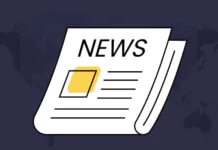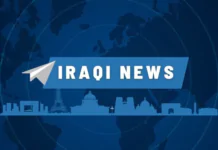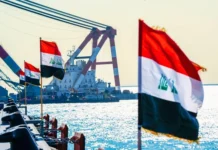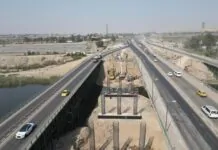Government Advisor: 3 Factors That Have Stripped The Parallel Exchange Market Of Its Price Influence And Diversified Our Financial Reserves
2025/07/07 Reads: 840 Times {Economic: Al Furat News} The Prime Minister’s Economic Advisor, Mazhar Mohammed Salih,confirmed that the stability of the price structure and the decline in annual inflation rates in Iraq are the result of the success of three integrated economic policies that operated in a coordinated manner within the framework of the state’s general economic policy. Saleh said in a statement to {Al Furat News} that:
“Fiscal policy has contributed significantly to supporting prices through the general budget,
whose expenditures constitute more than 13% of the gross domestic product,” noting that
“this support has been reflected in the expansion of social safety nets through food baskets, fuel price subsidies, and support for farmers, in addition to the provision of wide-ranging government services.”
He added, “Monetary policy, in turn, has achieved tangible success in maintaining the external value of the dinar by controlling domestic liquidity levels through the introduction of electronic payment systems and increasing demand for foreign currency at local banks through their correspondents abroad.
This has contributed to reducing financial transfer times and implementing compliance rules related to money movement risks.”
Saleh pointed out that “the third of these policies was price defense through the establishment of a hybrid market network, which provided a wide supply of goods at stable prices and directly impacted the local market by creating price competition that reduced opportunities for speculation.
As a result of these three factors, the effects of the parallel exchange market (the black market) were neutralized, especially with regard to generating inflationary expectations, whose effects have gradually faded.”
He stated that “there are commodity stocks available to the state and the private sector, some of which have a shelf life of three to five years, especially with regard to spare parts and durable goods, which enhances market stability in the medium term.”
Regarding the increase in gold reserves, Saleh explained that
“this is a successful monetary policy tool for diversifying Iraq‘s foreign reserves portfolio,” noting that
“gold represents a safe haven against fluctuations in global exchange rates and interest rates.” ‘
He added that “this diversification, which includes various foreign currencies and monetary gold,
is based on precise international standards to protect the country’s assets from value fluctuations between currencies.”
Regarding the impact of OPEC+ decisions, Saleh emphasized that
“Iraq is part of the international consensus within the organization regarding oil production levels, and
that the national oil policy enjoys great flexibility that enables it to maintain export levels within Iraq‘s quota, thus mitigating the impact of the decline in oil prices on public revenues.”
He noted in this context that “Triennial Budget Law No. 13 of 2023 includes flexible financial tools to address any emergency gaps through the possibility of resorting to bridge borrowing from the local financial market,
supported by monetary policy that provides sustainable liquidity through open market instruments, in accordance with the provisions of Central Bank of Iraq Law No. 56 of 2004.”
The advisor concluded his remarks by emphasizing that “the economic stability Iraq is witnessing today is the result of the integration of fiscal, monetary, and pricing policies into a unified framework
that promotes sustainable development and supports the implementation of the government’s program and comprehensive economic reforms.” https://alforatnews.iq/news/مستشار-حكومي-3-عوامل-جردت-سوق-الصرف-الموازي-من-تأثيراته-السعرية-وتنوع-احتياطاتنا-المالية
International Financing To Liberalize The Railway Sector
Economic 07/09/2025 Dr. Maytham Adham Al-Zubaidi In a remarkable move aimed at modernizing the transportation sector and boosting economic growth in Iraq, the World Bank has approved $930 million in financing for an ambitious project to expand and modernize Iraq’s railway network.
This project falls within the “Development Road,” which seeks to transform Iraq into a regional logistics hub linking the Gulf region to Europe via Turkey.
However, the importance of this project goes beyond simply improving infrastructure;
it represents a qualitative leap in
liberating the railway sector from monopoly,
enhancing competitiveness, and
opening the door to vital private sector participation.
The project encourages the establishment of dry ports and logistics centers in cooperation with the private sector, creating a new competitive environment and giving national and foreign companies the opportunity to enter the modern transportation system.
This transformation not only reduces costs, but also improves efficiency and creates competition in terms of quality and service.
Improving rail transport means
opening up markets to producers and consumers,
reducing shipping time and costs, and
enhancing competitiveness as a lever for economic development domestically and regionally.
Shifting a significant portion of road freight to rail will also
break the dominance of certain groups of companies that control the land transport sector,
creating a more equitable and competitive market balance.
The renewed railway line is expected to transport about (6.3) million tons of goods and more than (2.85) million passengers by 2037, which will enhance the connection between the governorates and drive economic activity across the country.
In addition, the project does not neglect the social aspect of job creation and sustainable development.
It is expected to provide more than 3,000 direct jobs during the construction phase,
in addition to approximately 22,000 job opportunities annually by 2040 in the field of operations and support services.
The project also includes specialized training programs for railway sector workers, with special attention paid to the participation of women.
The World Bank’s railway modernization project in Iraq, if implemented properly and thoughtfully,
will not merely be a technical financing exercise,
but rather a genuine structural reform aimed at building a more open and diversified economy based on partnership, competition, and transparency.
As Iraq enters a new phase of development after years of challenges, this initiative represents a turning point in building a competitive, sustainable, and equitable infrastructure. https://alsabaah.iq/117161-.html
Shorter Route Linking Turkey To Kuwait Through Iraq Now Operational
Iraq Amr Salem July 8, 2025 303 2 min Container trucks on a road. Photo: IRU
Baghdad (IraqiNews.com) – In a remarkable development, a new roadway corridor connecting Turkey to Kuwait across Iraq is now operating, significantly lowering transit times and increasing commercial effectiveness.
Major Turkish logistics company Hasbayrak International Transport successfully completed the first cargo across this route using the International Road Transport (TIR) transit system, according to the International Road Transport Union (IRU).
Three trucks carrying fresh fruit and vegetables left Turkey and arrived in Kuwait in just four days,
a substantial improvement over the customary 45-day sea route.
TIR-registered trucks crossed into Iraq at the Al Abdali border crossing and completed customs processes at the Sulaybia Dry Port, demonstrating the country’s operational preparedness.
The step also signified the formal resurrection of TIR in Kuwait, in collaboration with Kuwaiti authorities.
Iraq’s Border Ports Commission started applying the
International Road Transport (TIR) transit system in the country in the beginning of April.
As the only worldwide transit system, TIR permits the shipment of commodities in sealed load compartments under customs supervision from a country of origin to a country of destination d through a multilateral and mutually recognized system.
https://www.iraqinews.com/iraq/shorter-route-linking-turkey-to-kuwait-through-iraq-now-operational/
All Iraqi Government Institutions Now Using E-Payment Systems, Says Official
Iraq Jawad Al-Samarraie July 8, 2025 A person in Iraq using a POS machine to make an electronic payment. Photo by: INA Baghdad (IraqiNews.com) – All official government institutions in Iraq are now using electronic systems for payments and revenue collection,
marking a major milestone in the country’s digital transformation strategy, Government Media spokesperson Haider Majeed announced on Tuesday (July 8, 2025). Majeed stated
this nationwide shift, a key priority of the government program, aims to enhance transparency,
simplify procedures for citizens, and combat corruption by reducing reliance on cash transactions.
“This reflects the government’s strategic effort to modernize the financial infrastructure,” he said.
The directive has also been extended to all private sector entities with direct public interaction, including clinics, pharmacies, stores, and fuel stations.
Majeed noted there has been “wide acceptance” of e-payments from citizens, which has encouraged businesses to adopt the new systems.
The move is expected to improve the efficiency of government revenue and tax collection,
reduce financial leakage, and boost financial inclusion by encouraging more citizens to use modern banking services.
The General Secretariat of the Council of Ministers is overseeing the nationwide implementation.
https://www.iraqinews.com/iraq/all-government-institutions-adopt-e-payment-systems-2025/
For current and reliable Iraqi news please visit: https://www.bondladyscorner.com






